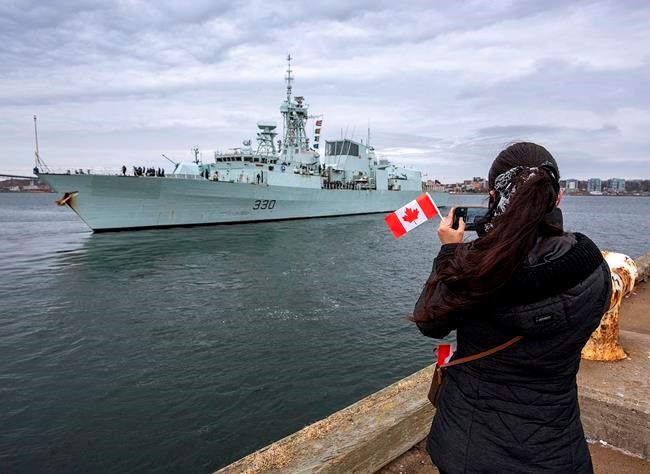OTTAWA ŌĆö A new poll suggests most Canadians think the federal government is already spending enough on the military, despite the push for a massive hike in defence funding.
It's been a contentious issue in recent weeks, with the war in Ukraine leading to renewed calls for sa╣·╝╩┤½├Į and other NATO allies to increase spending to two per cent of GDP. The LiberalsŌĆÖ five-year plan, released in last week's federal budget, will come short of that at 1.5 per cent, even with more than $8 billion in new military spending.
According to a survey conducted by Leger last weekend, that's enough for many Canadians.
Just shy of half of the people polled said the government is spending the right amount and another 18 per cent said it should spend less. The remaining 34 per cent said they want more money in the defence budget.
Christian Bourque, executive vice-president of Leger, said those numbers were surprising given the public conversation about NATO spending targets.┬Ā
"There is something about changing that equation in sa╣·╝╩┤½├Į that doesn't sit right, apparently, with the majority of Canadians," he said.
Leger surveyed 1,538 Canadians between April 8 and 10. A margin of error cannot be assigned because online polls are not considered truly random samples.
Bourque contrasted responses on defence to those on the housing budget or measures to curb inflation, where the majority of people polled said the government isn't spending enough. ┬Ā
The polling firm has never asked a question about overall defence spending before, though it has sought opinions on specific contracts like the purchase of fighter jets, for example.
Those most likely to want more military funding live in Atlantic sa╣·╝╩┤½├Į and Alberta. About half of those in Manitoba, Saskatchewan, Ontario, Quebec and sa╣·╝╩┤½├Į said defence spending is just right.┬Ā
Bourque said the government needs to consider how it communicates the plans to spend more, not only on NATO, but also on Arctic sovereignty.┬Ā
Meanwhile, when it comes to the entire budget, 38 per cent of respondents said they believe the government is heading in the right direction, 32 per cent believe it is heading in the wrong direction, and 30 per cent said they don't know.┬Ā
More than a third of the 254 NDP voters polled were unsure about the budget their party supports.┬Ā
The party announced a confidence and supply agreement with the Liberal minority government last month, with leader Jagmeet Singh promising the NDP will support the next four budgets in exchange for action on key policy measures. The Liberals set out plans for a new dental-care program and made significant promises on housing affordability as part of that arrangement.
Still, 36 per cent of NDP voters reported being unsure about the spending plans. Another 47 per cent felt it was heading in the right direction and just 17 per cent said it was taking the country in the wrong direction.┬Ā
Most Liberal voters who were polled ŌĆö 69 per cent ŌĆö agreed with the budget and most Conservative voters ŌĆö 61 per cent ŌĆö disagreed.
The poll also suggests Pierre Poilievre is the front-runner in the race to be the next Conservative party leader, and he may give the party the best chance of forming government.┬Ā
Leger asked people to choose from the list of 11 candidates running for the top job. Poilievre was the top choice for 43 per cent of 377 self-identified Conservative voters, with Jean Charest coming in a distant second at 18 per cent.┬Ā
"This will maybe lead to a fairly, I'd say heated, sometimes maybe dirty campaign, with two candidates that will tend to polarize the race," said Bourque.┬Ā
He said it appears Poilievre would lead the Conservatives in a close race in the next federal election. The poll suggests 29 per cent of all decided voters would choose a Poilievre-led Conservative party, while 32 per cent would go for the Liberals.┬Ā
"He's going to deliver the support that the Conservatives also got in the last election," Bourque said.
The Liberals won 32.6 per cent of the popular vote in the 2021 election.┬Ā
If Charest were the next leader, the survey suggests Justin Trudeau's Liberals could decidedly win the next election.┬Ā
A Charest-led Tory party was the top choice for 23 per cent of all decided voters polled, while Trudeau captured 32 per cent.┬Ā
"This is where we see some portion of Conservative supporters saying, 'Well, I'm going over to (People's Party of sa╣·╝╩┤½├Į Leader Maxime) Bernier now,'" Bourque said.┬Ā
On the other hand, Bourque said there may be a portion of Tory voters who think Poilievre can't deliver a win, because the results are so similar to the last two elections.┬Ā
The Conservative leadership will be decided on Sept. 20 using a ranked ballot system.┬Ā
No other candidate got more than five per cent of Tory support in the poll, and almost a quarter of respondents said they didnŌĆÖt know who would make the best leader.┬Ā
This report by The Canadian Press was first published April 14, 2022.
Sarah Ritchie, The Canadian Press



